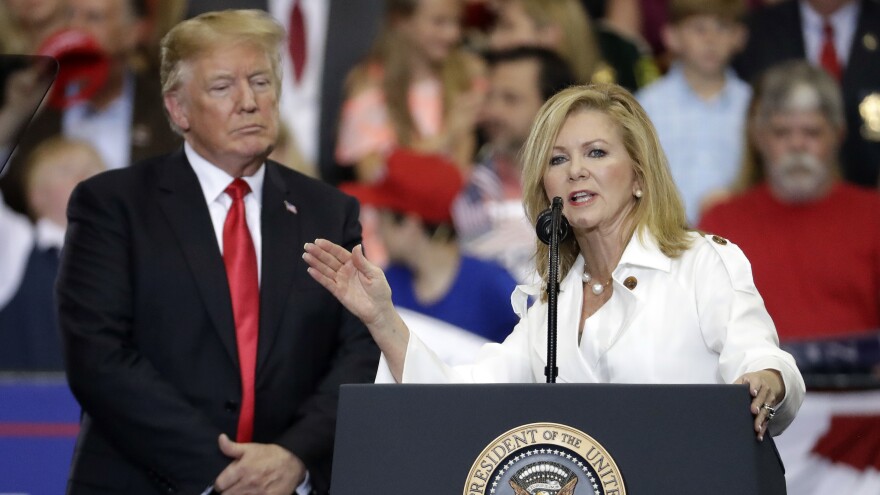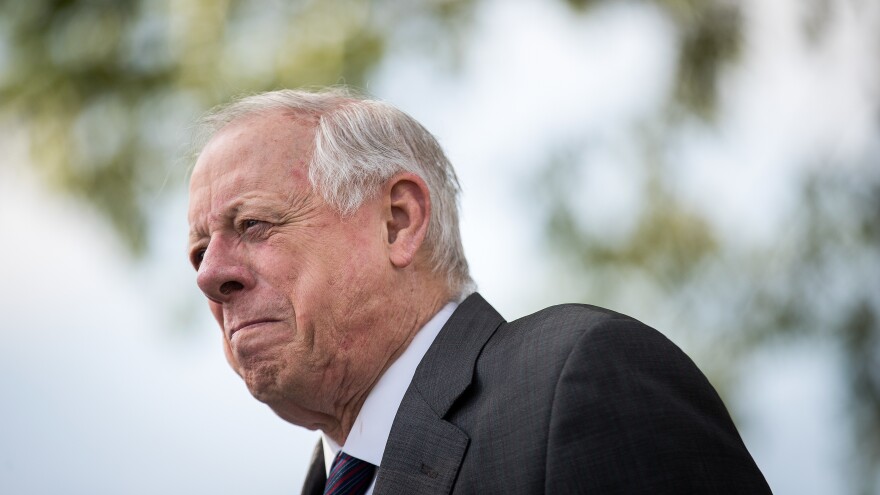In the Trump era, the phrase "all politics is local" may feel like an anachronism. But in Tennessee, Phil Bredesen is trying to prove that national partisan divides can be overcome in the most surprising Senate battleground of 2018.
The former Democratic governor's strategy against GOP Rep. Marsha Blackburn in the race to replace retiring Republican Sen. Bob Corker has been focused on listening sessions with small groups and trying to go beyond just national talking points. In fact, at a health care roundtable last month with about a dozen women in Covington, Tenn., the words "Republican," "Democrat" or "Trump" didn't come up once.
"Really, we'd like to explore what [health care] means to you — what particular problems you might be seeing to help inform me about how to think about this," Bredesen said as he opened the floor to the women, spending most of the hour simply listening.
The women talked about the high cost of insurance, difficulty paying for prescription drugs and struggling to just get certain treatments covered by their insurance plans.
Erica Glass, a full-time student and a mother of three, spoke about how hard it's been getting care for her 5-year-old daughter Hadelynn, who was born with a birth defect.
"I just want my child to be taken care of and get everything that she possibly ever needed and not have to fight tooth and nail to get it provided to her," Glass said.

Glass voted for President Trump in 2016 and is still undecided in this Senate race but said she liked how Bredesen, a former health care management executive before entering politics, listened to her concerns.
"A lot of people want to hear the negative things instead of focusing on the positive and how it can benefit them. So I think if we can just all be more positive and be more open minded it would probably benefit everybody a little bit better," she said.
Bredesen will have to convert voters like Glass if he wants to beat Blackburn and convince them he's got their best interests at heart. But to many — even if they liked Bredesen as governor — just the fact that he has a "D" beside his name is a non-starter when talking about a federal versus a state race.
"I voted for Bredesen for governor. I thought he was an excellent governor. I think he did excellent things for our state. However, Washington is a different animal. In Washington, you don't necessarily vote for what's best for the people. You vote party lines," Robertson County Commissioner Faye Stubblefield said after a Blackburn event in Portland, Tenn., earlier that week.
In her announcement ad last fall, Blackburn touted that she's a "hardcore, card-carrying Tennessee conservative" who's "politically incorrect and proud of it" and emphasized she'd support Trump.
But in Blackburn's first general election spot released this week, there wasn't even a mention that she was a Republican or anything about the president. Instead she tells voters in a more muted tone that she's "in this fight so that we can win, and the we is the people, the Constitution, the country" — perhaps a sign that she is working to appeal to the center as well and not just GOP base voters.
Bredesen, meanwhile, has proven he can win across party lines. He was first elected governor in 2002 and then won re-election in 2006 in a landslide, carrying all of Tennessee's 95 counties. But the state has moved to the right over the past decade, with Trump winning the state by 26 points in 2016.
On the ballot again in a very different environment, Bredesen says he knows he has to convince voters he'll continue the independent streak in Washington that he cultivated as governor.
"I'm not going up there to be lockstep in some way with what the national Democratic Party has become. You have to join the party to participate in electoral politics but the party for me is an organization I belong to — it's not a religion and I don't think that I will go to hell if [Senate Minority Leader] Chuck Schumer doesn't like what I say about something or other," Bredesen told NPR in an interview after the event in Covington.
His way to try to show voters that's the approach he'll take is to hold small events on local issues including health care as well as trade and tariffs that have affected Tennessee's agriculture community and even on Asian Carp, an invasive species that has harmed the state's fishing industry.
There are areas where he agrees with President Trump, like on rolling back regulations. In an early TV ad, Bredesen said that "There's a lot of things I don't personally like about President Trump, but he's the president of the United States. And if he has an idea and is pushing something that I think is good for the people of Tennessee, I'm going to be for it — it doesn't matter where it came from. and likewise, if I think it's not going to be good for Tennessee I'm going to be against it."
Sara Gangaware, who attended Bredesen's health care roundtable in Covington, likes that type of approach. She voted for Hillary Clinton in 2016. She's voted for Republicans in the past but is supporting Bredesen this fall because she thinks the former governor would best carry on the centrist, pragmatic tradition that other Tennessee senators recently have — including the retiring Bob Corker, who's had plenty of praise for Bredesen while initially only offering tepid words of support for Blackburn.
"It's a serious problem that people are so blindfolded by party issues and they make decisions based simply on a party. It's almost, if you get right down to it, it's almost gang-like activity," said Gangaware.
Bredesen isn't naive about the heavy lift in front of him. He knows how far the Democratic Party has fallen in the South — in fact, he warned party leaders that they could face a backlash just like they did in 2016, but his warnings fell on deaf ears.
"I was really concerned that the Democratic Party has been getting a little too elitist and too distant from the concerns of the very down to Earth people that have always been the base of the party," Bredesen recalled. "I made President Obama unhappy during his election when I suggested one time that he spend more time in Wal-Mart and less time in Europe."

But on the campaign trail, Blackburn was still largely emphasizing that Bredesen would vote in lockstep with national Democrats, and that a win by her opponent could endanger the GOP's Senate majority. When speaking to voters last month, she ticked off pivotal Trump positions to underscore how in line with the president she would be.
"Phil Bredesen probably would be there voting with [Democrats]," Blackburn said. "Tennesseans want somebody who is going to stand with President Trump and build that wall. I will build that wall with President Trump."
The race remains tight in polling, though many analysts think the Republican tilt of the state will eventually win out. But Bredesen says that if he is able to win despite the odds, he could offer a model for Democrats on a path back to relevance, especially in the South. If he isn't successful though, it might mean that the country has become simply too divided to bridge the gap.
"The criticisms of me, just listening to what my opponent says about me, is not about my policies or anything I've done — it tends to be about, 'Well he's a Democrat. That's a bad thing and he'll vote for things Democrats want,' " Bredesen said. "But I think if I lose it'll be a combination of failures on my own part and, I think the failure of the national Democratic Party to be responsive to a lot of the concerns and parts of the country that are not next to the ocean."
Copyright 2021 NPR. To see more, visit https://www.npr.org.




